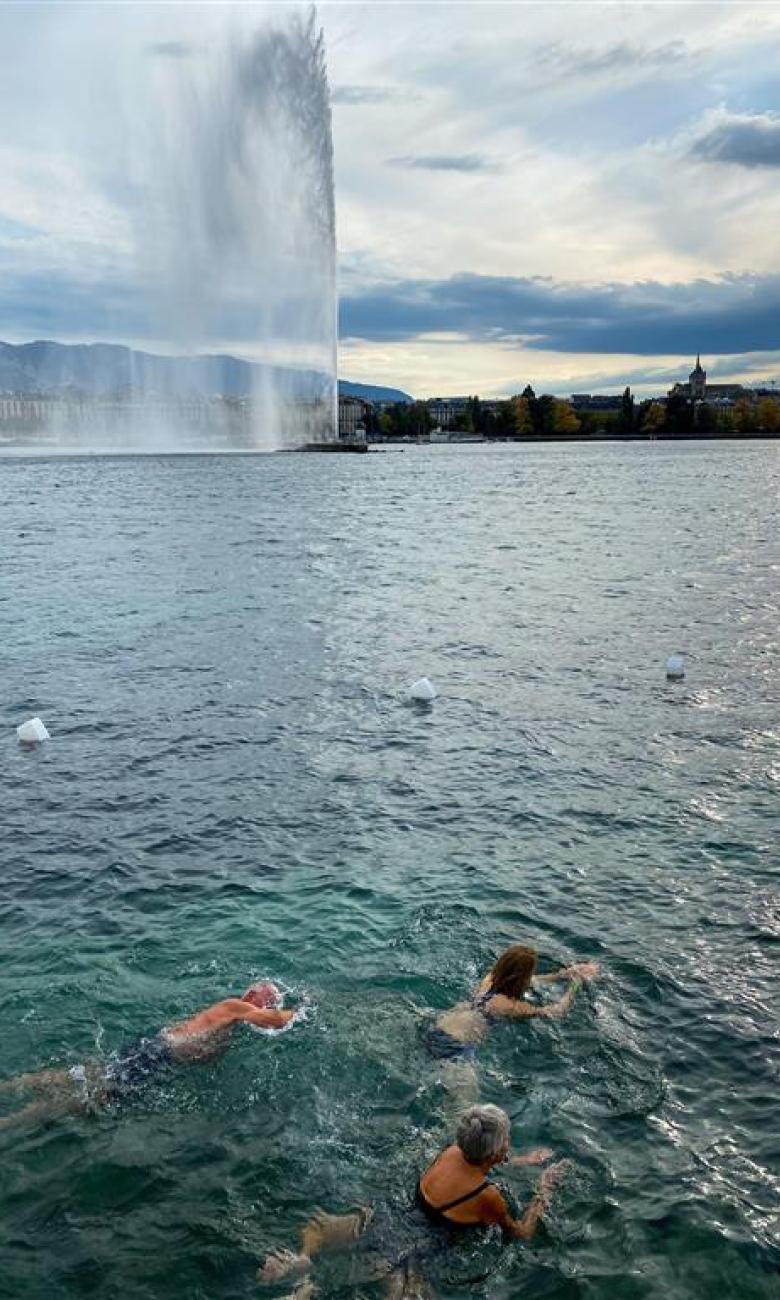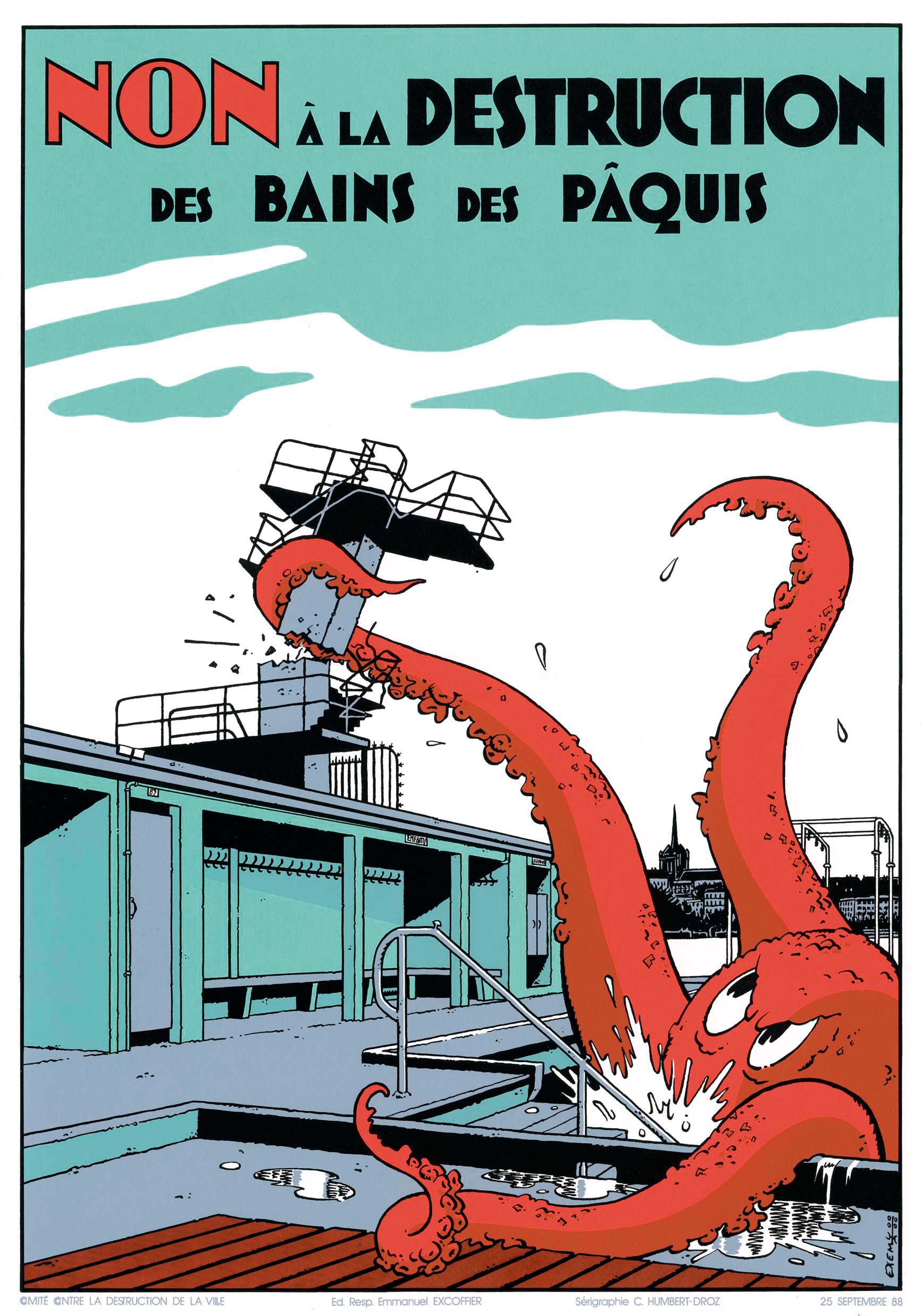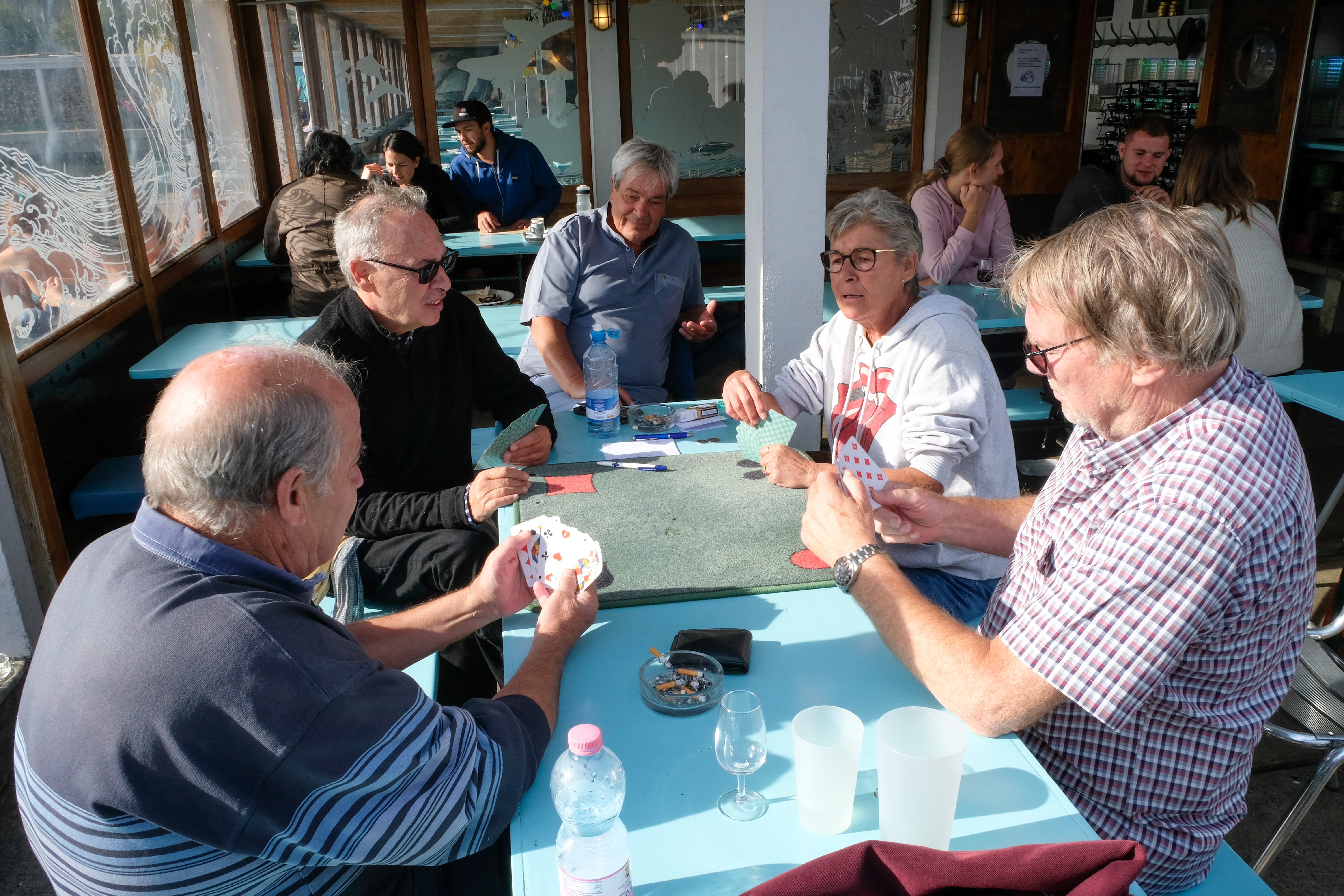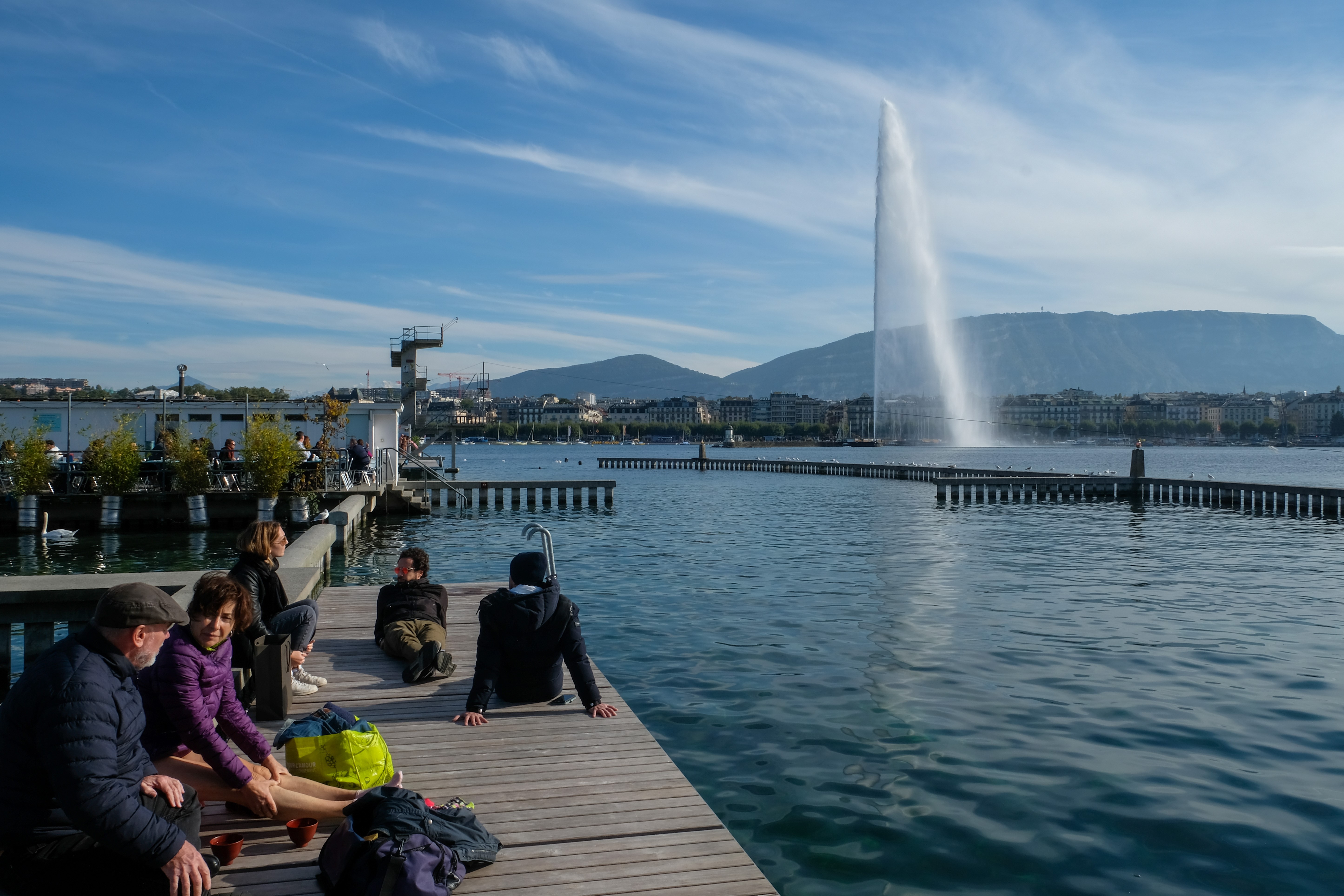Better together : the free spirit of Geneva’s Bains des Pâquis
Ever since 1932, the heart of Geneva's harbour has been home to an odd-looking, reinforced concrete cruise ship that never leaves its spot. Its purpose? To give passengers from all walks of life a warm and friendly place of rest and relaxation. 365 days a year, they flock to it in their thousands from all four corners of the city – to eat, swim or just stroll around this jealously-guarded spot of freedom.
Whether you want to escape the urban grey of the city, recharge your batteries, meet up with old friends or make new ones: swimming isn't the only thing on the menu at the Bains des Pâquis. "What about going for a fondue at the Bains?" is a sentence that will come up sooner or later if you live in Geneva. And even if you're not a fan of melted cheese, you can still go for the atmosphere, the breathtaking view of the Jet d'Eau water fountain and Mont Blanc, and the sun reflecting on the lake's surface – knowing full well there'll be other high-quality dishes at a price that is more than affordable.

While the rest of Geneva's establishments fall prey to inflation, it appears to have had little impact here. Fancy a coffee? At the Bains it'll only set you back two francs fifty. The dishes of the day are homemade and bursting with fresh ingredients. They also have surprising names for a simple beach bar (on the lunch menu today, 21 October, we have paccheri with a parmesan and squash cream sauce or spaghetti with mussels from Mont-Saint-Michel). And the price? 14 francs, or 10 if you're retired, unemployed or disabled. Because the prices are closely monitored in true shipshape fashion by the Association d’usagers des Bains des Pâquis (AUBP).
A free space, against all the odds
The AUBP grew out of a grassroots campaign launched in 1987 against the so-called modernisation of the Bains, which was actually a project to demolish the place and rebuild from scratch.
The Pâquis neighbourhood mobilised quickly and was soon joined by intellectuals, artists and well-known people from the whole city. "The aim of the project was to transform the Bains into a place for hotels with a completely different clientele in mind" recalls Armand Brulhart, who has been a member of the AUBP since it was founded and is a living testament to the association's story. "We discovered that even the more well-off Genevans still had a soft spot for the Bains, partly because it was where most of the children had learned to swim and where the local schools took turns to go swimming." Thanks to Switzerland's system of direct democracy, the AUBP was able to present a counter-proposal which, in September 1988, was overwhelmingly endorsed by the citizens of Geneva. The municipal authorities were obliged to back down, and the AUBP's renovation project, preserving the Bauhaus-inspired sober architecture of the Bains, went ahead.
This episode of peaceful resistance is woven into the deeply democratic, even libertarian some might say, DNA of the Bains. In fact, traces of these times can still be seen to this day – although most visitors won't be aware of it – such as the label on the eponymous bottles of red, white and rosé wine, depicting an octopus trying to take over a freely accessible public space with its grasping tentacles.

1988 © EXEM
But it wasn't just a structural renovation that the Bains underwent in the 1990s; it was also recast from a mere seasonal lido into a hot spot for meetings, shows and sociocultural events, open to the public all year round. The long list of activities on offer at the Bains, whether in the water or on dry land, now also includes poetry readings, philosophical discussions, concerts and exhibitions, and continues to delight all visitors, young and old, as it did more than a century ago.
What everyone really wanted was to keep the Bains as a place for the people and bring culture back to life, to create a kind of patchwork of culture, religion and ideas.
explains Philippe Constantin, one of the first to join the ranks of the AUPB before becoming its coordinator and now director. "Although the Bains' success is down to many things, these free cultural events are key. Everyone is welcome to take part. The Bains aren't just a place to drink, party or jump in the water; they're much more than that."
Diverse, cosmopolitan and tolerant: society as it is
Going to the Bains also means bathing in a mixed crowd where ethnic, social and religious backgrounds have been erased. It's a bit like the Swiss military service: a place where gardeners, binmen and bakers rub shoulders with lawyers, bankers and international civil servants, just without the hierarchy or uniforms. You can show up in a swimsuit and flip-flops or a three-piece suit and waistcoat. You can even go in your birthday suit, as long as you confine yourself to the steam room in winter or swim all the way round the Bains without ever getting out of the water (yes, it's possible, just ask the swimmers).
"If everyone's naked or just wearing a swimsuit, class distinctions disappear" Constantin states. "That's also why we have long tables in the restaurant, so that everyone sits together. The Bains are a reflection of society as it is."
In a city that is home to numerous international organisations, including the Office of the United Nations High Commissioner for Human Rights and the International Committee of the Red Cross, you can usually hear any number of languages being spoken. This doesn't just happen on the terrace of the restaurant but also in the cramped space behind the bar, a veritable melting pot of nationalities, cultures and interests.

"Hi, how are you?" the waiter says in French, or English, Portuguese, Spanish, Kurdish, Arabic or Indonesian, smiling in spite of the concentration needed to land three dishes of the day at the right table while navigating between a colleague changing a keg of beer and another restocking the cold room. "Hot!" (in French from the kitchens) is shouted most often, both as a warning to others and a means of self-protection.
"It's like a huge melting pot" says Laurent Grégoire, who has worked as a chef at the Bains since 2014."It's amazing to work with people from so many different ethnic and religious backgrounds and to see that we can still achieve something when we all work together. It's the most positive thing about it all. Getting everyone to adapt to common standards of respect can be complicated, but we usually get there after they've had a bit of time to get into the spirit of the place and see how it works".
New wave(s) of resistance
The global reach of the most recent wave to rock the Bains community did not spare Geneva either: the COVID-19 pandemic. But here again, the concept of resistance was key to mobilising people to keep the ship afloat –to resist and confront the invisible enemies of gloom, fear and isolation through joie de vivre, community spirit and laughter in the face of adversity.
While waiting for better days, Geneva's motto post tenebras lux (after the darkness, the light) seems to have been bolstered, in spirit at least, by the more aquatic motto of Paris: fluctuat nec mergitur (beaten by the waves, but not sunk).
During the long months of lockdown, Constantin slept at the locked Bains on his own. "We wanted to have a captain on board, steering the ship". He issued his first provocative post very quickly, in March 2020, "against the virus and everything that was going on": a live poetry reading on the facebook page of the Bains."We had to resist to exist," he says. Between the lockdowns and reopenings, the cruise ship remains firmly moored – in spite of the ever-present uncertainties. "We went from the Bains in resistance (BeR) to the Bains in resilience."
Demonstrating the non-violent nature of the resistance flies the Bains flag, created during the 2020 lockdown. Red and white, just like the national one, it depicts a heart in place of the Swiss cross, fluttering alongside the 10-metre diving board, which issues its own silent challenge with one simple word: "poetry".
Breaststroke or diving: the choice is yours
Whether you're passing by, hanging out or working at the Bains, it's the same as for the omnipresent swimmers: splash and frolic about on the surface, enjoying the beautiful landscape, or dive down deep to discover what's hidden beneath. At the Bains, you can choose when you go, who you meet, and what you do there – with or without knowing what's going on behind the scenes. It's all there, for the enjoyment of the community. And maybe that's what the spirit of the Bains is all about.

Special thanks to Armand Brulhart and Eloi Contesse at the Centre d’iconographie, Bibliothèque de Genève for the illustrations.
Cover image : © JF Vercasson
Teaser and portrait images : © Miguel Quintana




